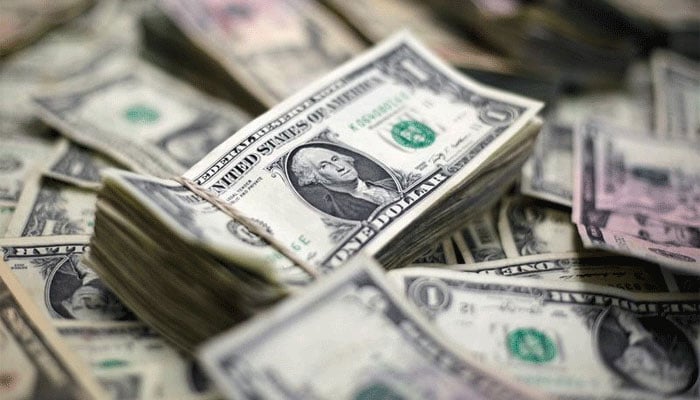Current account deficit narrows to $623m in April
Total imports fell by four percent month-on-month to $6.0 billion in April, while exports rose three percent to $3.154 billion
KARACHI: Pakistan’s current account deficit fell by 39 percent to $623 million in April from $1.0 billion the previous month, boosted by a jump in remittances and decline in imports, the central bank said on Thursday.
“Current account deficit shrank to $623 million, in April 2022; only two-thirds of March 2022 deficit of $1,015 million. A rise in the workers’ remittances (by $315 million) and a fall in imports (by $246 million) explain this reduction,” the State Bank of Pakistan said in a tweet.
April’s current account gap is much smaller than analysts expected, which is a positive sign for the battered economy. Total imports fell by four percent month-on-month to $6.0 billion in April, while exports rose three percent to $3.154 billion. Remittances from the Pakistani citizens employed abroad rose to an all-time monthly high of $3.125 billion in April.
However, the current account deficit reached $13.779 billion in 10 months of this fiscal year, compared with a deficit of $543 million in the same period last year. The balance of payments numbers come as the coalition government has opened talks with the Internationa l Monetary Fund (IMF) to resume the stalled $6 billion bailout.
The government sought to increase the size and duration of the loan programme as the foreign exchange reserves of the central bank declined to 10.2 billion during the week ending May 13 that can cover less than two months of imports.
A surging current account deficit amid higher imports are putting pressure on the rupee. The government is expected to withdraw energy subsidies and roll back unfunded subsidies to the oil and power sector.
The government has imposed a ban on the imports of all luxury and non-essential goods in an effort to stabilise the foreign exchange reserves and ease pressure on the currency, as the country faces the economic crisis.
-
 Inside Cardi B's Real Feelings Related To Stefon Diggs Split Post One Year Of Romance
Inside Cardi B's Real Feelings Related To Stefon Diggs Split Post One Year Of Romance -
 Former Sri Lankan Intelligence Chief Arrested Over 2019 Easter Bombings
Former Sri Lankan Intelligence Chief Arrested Over 2019 Easter Bombings -
 Kristen Bell Shares One Rule For 'SAG' Awards Ceremony That She Will Ditch This Time: 'Happy And Fun'
Kristen Bell Shares One Rule For 'SAG' Awards Ceremony That She Will Ditch This Time: 'Happy And Fun' -
 Woman Suing Meta Platforms, YouTube Over Social Media Addiction Sticks To Claims After Trial
Woman Suing Meta Platforms, YouTube Over Social Media Addiction Sticks To Claims After Trial -
 Shakira Applauded For 'gracious' Behaviour By Fans As She Blends Work With Family Downtime
Shakira Applauded For 'gracious' Behaviour By Fans As She Blends Work With Family Downtime -
 Prince William Hits The Roof With The Andrew Saga Bleeding Into Earthshot
Prince William Hits The Roof With The Andrew Saga Bleeding Into Earthshot -
 Mexico’s President Considers Legal Action Over Elon Musk Cartel Remark
Mexico’s President Considers Legal Action Over Elon Musk Cartel Remark -
 HBO Gives Major Update About 'Industry' Season Five And Show's End
HBO Gives Major Update About 'Industry' Season Five And Show's End -
 Donnie Wahlberg Responds To 'Boston Blue' Backlash: 'Nobody Was More Disappointed Than Me'
Donnie Wahlberg Responds To 'Boston Blue' Backlash: 'Nobody Was More Disappointed Than Me' -
 Jennifer Garner Gets Emotional Over Humble Career Start: 'It Makes Me Want To Cry'
Jennifer Garner Gets Emotional Over Humble Career Start: 'It Makes Me Want To Cry' -
 Princess Beatrice Told An Acquaintance That She ‘likes’ Jeffrey Epstein: Grim Verdict Drops
Princess Beatrice Told An Acquaintance That She ‘likes’ Jeffrey Epstein: Grim Verdict Drops -
 Late Katherine Short's Neighbours Give Insights Into Her 'peace Loving' Personality Post Suicide
Late Katherine Short's Neighbours Give Insights Into Her 'peace Loving' Personality Post Suicide -
 Fresh Details Of King Charles, Queen Camilla's US Visit Emerge Amid Andrew Investigation
Fresh Details Of King Charles, Queen Camilla's US Visit Emerge Amid Andrew Investigation -
 Iran 'set To Buy' Chinese Carrier-killer Missiles As US Forces Gather In Region
Iran 'set To Buy' Chinese Carrier-killer Missiles As US Forces Gather In Region -
 Prince Harry And Meghan Unlikely To Meet Royals In Jordan
Prince Harry And Meghan Unlikely To Meet Royals In Jordan -
 Hero Fiennes Tiffin Shares Life-changing Advice He Received From Henry Cavill
Hero Fiennes Tiffin Shares Life-changing Advice He Received From Henry Cavill




